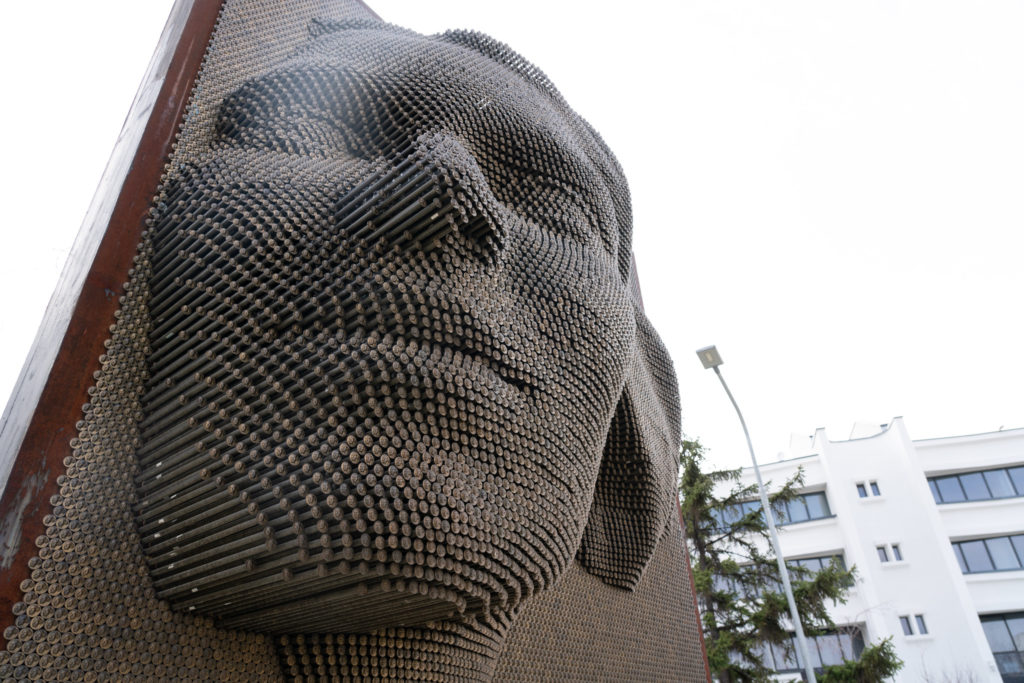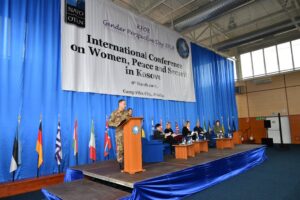
WOMEN, PEACE AND SECURITY IN KOSOVO: EMPOWERMENT THROUGH THE TANGLES OF TRADITION
INTRODUCTION: A NEW ENTITY, A NEW AGENDA
On October 31, 2000, the UN Security Council issued Resolution 1325 on Women, Peace and Security (WPS), definitively recognising that a project for building a peaceful, developed and fair world cannot exclude women. The resolution stated that women must have a stronger and more incisive role in the prevention and resolution of conflicts, as well as in peacebuilding operations, addressing Member States to take actions in the legislative, financial, judicial, technical and logistical fields.
On that day, Kosovo was still coping with the consequences of the war. The year before, the Kumanovo Agreements concluded the Kosovo War (1998-1999), and on June 10, 1999, the UN Security Council adopted Resolution 1244 , establishing the UN Mission in Kosovo (UNMIK) to provide humanitarian assistance and to support a long-term process for peacebuilding, security and development. The birth of a new entity was thus the opportunity to start the social reconstruction and, under the guidance of Resolution 1325, to be at the forefront in the way of facing this challenge, ensuring from the beginning a stronger participation of women. With regards to progress in the implementation of the WPS Agenda, we have to evaluate Kosovo from both a historical and a cultural point of view. On the one hand, in a land without a pre-existing institutional framework, UNMIK laid the foundations for the development of democratic institutions as well as economic and social reconstruction.
Nowadays, Kosovo is a young republic with an undefined status: it declared its independence from Serbia on February 17, 2008, but it has yet to be fully recognized by the international community. Moreover, many unsolved political, economic and social issues continue to hold the country back. On the other hand, the country’s cultural background has had a strong influence on how Kosovo dealt with women empowerment. In particular, Kosovar society has been traditionally characterised by a patriarchal structure that excluded girls from education and social life (especially in rural areas) – a very traditional culture that is still having extreme and paradoxical consequences: thousands of women victims of rape during the war are considered cause of dishonour for their families, condemned by the common feeling to a perpetual silence.
The birth of a new entity was thus the opportunity to start the social reconstruction and, under the guidance of Resolution 1325, to be at the forefront in the way of facing this challenge, ensuring from the beginning a stronger participation of women.
______
THE WORKING PLAN 2013-2015: POSITIVE NUMBERS, COMPLICATED REALITY
Kosovo has tried to integrate a gender perspective in its legal and institutional framework since the beginning of its post-conflict transformation and modernisation, even before the birth of the entity’s first government in January 2008: for instance, on can see the first Law on Gender Equality, passed in 2004, and the Kosovo Programme for Gender Equality (KPGE) adopted for the period 2008-2013. A step forward has been done with the adoption of the Working Plan (WP) 2013-2015, a National Action Plan to implement Resolution 1325 and the KPGE. Officially approved in January 2014, activities for the Plan’s drafting and actualisation had been carried out since 2013 under the guidance of the Agency on Gender Equality of Kosovo, in collaboration with other ministries, judicial institutions, civil society, media and different interest groups, and with the support of international partners, like UN Women and the Office of the High Commissioner for Human Rights (OHCHR). A Working Group of 28 members was thus established in order to be broadly representative, inclusive, multi-sectoral, transparent and to provide a document acceptable to all stakeholders.
Progress, in terms of gender equality and the participation of women, can be analysed by looking at some of the data from the Working Plan 2013-2015 and comparing it with the most recently available information. Regarding political representation in Parliament and local assemblies, the presence of women is guaranteed by Kosovo’s Law on general elections and the Law on local elections through the provision of specific quotas (30%): nowadays, after the 2019 political elections, 39 out of 120 deputies are women (33%). However, their placement in decision-making shows a significant disequilibrium in favour of men and many barriers remain to achieve their equal participation.This situation affects the structure of political parties since the percentage of women in leading position is still low (from 10% in 2013-2015, to an average of 20% in 2017). Moreover, it has been shown that media coverage of political debates does not give the same visibility to female compared to male candidates. Consequently, the public perception of women’s participation is lower. As a matter of fact, according to a first evaluation of the KPGE, published in 2016, the programme did not contribute to the improvement of the image and the representation of women in media.
A similar condition can be found at the executive level and in public administration: mechanisms to achieve gender equality have been provided, causing the incrementation of the number of women in public offices, whose effects we can see today. However, women continue to suffer disadvantages in terms of managerial positions (an average of 31% at central and local level in the reporting period 2014-2016). The only virtuous examples were the Presidency of the Republic, as the first woman President was designated in April 2011, Mrs Atifete Jahjaga, with a staff composed of five women and four men; and the first female mayor, Mrs Mimoza Kusari Lila, elected in the municipality of Gjakova in 2013.
Similarly contradictory trends can be found in other sectors. In the judicial system, for example, some courts present a majority of female judges, but just a few reach apical positions. A good trend has, however, been registered in the implementation of women’s participation to peacekeeping and peacebuilding processes: according to the Working Plan, 67% of relevant initiatives had been completed and currently 30% of all foreign service staff is composed by women. At the same time, other activities related to peacekeeping and peacebuilding missions abroad have been postponed because the current international status of Kosovo impedes to send forces. In Kosovo’s Police, despite the significant growing number of women, they continue to suffer discrimination, especially uniformed staff: in fact they easily resigned from their role because of unsuitable working conditions, lack of security, and few chances for promotion; a not friendly working environment, delegation of duties and belittling of women’s values.

______
THE LEGISLATIVE AND INSTITUTIONAL PERSPECTIVE
In relation to legislation concerning women’s rights and gender equality, progress is more readily seen, in the the Constitution (2008), the Law against discrimination (2004), the new Law on gender equality (2015), the Law on protection from domestic violence (2010). The newly formed state has also tried to adapt its set of rules to international law, chiefly the UN Convention on the Elimination of all Forms of Discrimination against Women, the European Convention on Human Rights, and the Acquis Communitaire of the European Union.
Similar efforts have been done in terms of policies and strategies: the Anti-trafficking National Working Programme; the Working Plan for the Economic Empowerment of Women; the Policy on Human Rights and Gender Equality by the Ministry of Kosovo Security Force. These have achieved some improvements: the number of women engaged in business and women householders have increased, for example, while progress has been recorded in reducing the illiteracy rate. At the same time, much work still needs to be conducted regarding the security sector.
Importantly, Kosovo has created an institutional framework composed of public and civil society bodies, both national and international, with the explicit mission to promote gender issues, protect human rights and empower women: the Parliament and its internal Committee, the Agency on Gender Equality, the Kosovo Security Force, the Ombudsperson, UN Women, UNDP, the OSCE and the KFOR (the NATO peacekeeping force) all participated in studying the content and in drafting the Working Plan. KFOR also organised, in 2018, the “International Conference on Women, Peace and Security” to facilitate a platform for local and international institutions and organisations to discuss gender-related topics with focus on the security and the younger generations.
Civil society organisations deserve a special mention for their strong commitment in implementing Resolution 1325 and supporting the inclusion of women’s voices in other institutions, development policies and programmes. For instance, the Kosovo Women’s Network gathers hundreds of members, including organisations representing women from across Kosovo and all social, political and ethnic groups, coordinating their efforts for raising women’s awareness of their role in the development of society and in the contribution to the national peacekeeping and peacebuilding process through education, training and social assistance.
Nevertheless, only a few mechanisms were developed to make gender equality substantive. The employment and socio-economic situation of women is still disadvantageous compared to men, despite the adoption of the Working Plan for the Economic Empowerment of Women. Notable progress has been achieved with regards to domestic violence and the provision of services to survivors, thanks to the adoption of the Law on protection against domestic violence and the development of the National Programme and Action Plan against Domestic Violence, but the reintegration of victims remains a pressing challenge. On education, the relevant Ministry and municipalities have implemented several activities for less advantaged girls (e.g. covering transportation cost, providing scholarships, etc.), while the Ministry of Labour and Social Welfare runs training courses. A decrease on illiteracy rate and a higher enrolment rate of women have been recorded, but indicators of access and participation in various levels of education still highlight gender differences.
Women empowerment in contemporary Kosovo does not need only legal reforms to reduce gaps and limitations, but it has to be addressed with a deep context and cultural analysis, especially in rural areas, to identify challenges concerning the perception of the role of women both inside and outside the family, in politics, in business and so on.
______
CONCLUSION
During the UN Global Open Day on “Women, Peace and Security”, held in Pristina in 2018, panelists from international organisations, politics and civil society acknowledged outcomes achieved so far; at the same time, however, they underlined the necessity of further efforts to ensure equality at every level, to overcome bias typical of a male-mindset and to strengthen the awareness about female leadership potential, political representation and decision-making.
Sometimes, even in front of an advanced legal and institutional framework, there is not an immediate answer from the population, because the cultural background needs more time to adapt to breakthroughs. The issue of women empowerment in contemporary Kosovo does not need only legal reforms to reduce gaps and limitations, but it has to be addressed with a deep context and cultural analysis, especially in rural areas, to identify challenges concerning the perception of the role of women both inside and outside the family, in politics, in business and so on.Traditional biases can be overcome by strengthening the gender perspective in educational programmes, in order to promote equality between men and women in dignity and freedom of choice. This is real even more so in the specific context of Kosovo, where women are not only trying to emancipate themselves from a patriarchal vision, but where they also bear the consequences of the war since they were directly targeted by combatants.
Addressing the impact of violence on women is paramount to the path of reconciliation and durable peace; therefore any peacebuilding process cannot neglect the gender dimension to ensure equal participation and full enjoyment of rights for girls and women, as well as their full involvement in the maintenance and promotion of peace and security. In this regard, there is hope that the implementation of the new KPGE 2020-2024 and the National Action Plan 2020-2022 will lead to breakthroughs.
____________
Giona Michele Scilla is a Student at the Master’s Degree in Cultural Diplomacy of the Università Cattolica del Sacro Cuore.
This article was published under the aegis of theEnhancing Women’s Participation in Peace and Security (WEPPS) project, whose goal is to strengthen the effectiveness and impact of the WPS Agenda in Italy, North Africa and the Western Balkans. The WEPPS project is being implemented by the ERIS group (Emerging Research in International Security) of the Scuola Superiore Sant’Annain Pisa, Italy, in partnership with the Agency for Peacebuilding. It is funded by the Italian Ministry of Foreign Affairs and International Cooperation.































